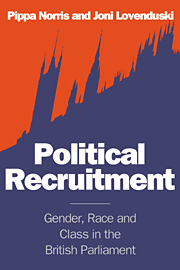Book contents
- Frontmatter
- Contents
- List of figures
- List of tables
- Preface
- 1 Puzzles in political recruitment
- Who selects and how?
- Who gets selected, and why?
- Does the social bias matter?
- 11 The values, priorities and roles of MPs
- 12 The personal vote
- 13 Reforming recruitment
- Appendix A Details of the survey design and sample
- Appendix B Questionnaires
- Notes
- Bibliography
- Index
12 - The personal vote
Published online by Cambridge University Press: 07 December 2009
- Frontmatter
- Contents
- List of figures
- List of tables
- Preface
- 1 Puzzles in political recruitment
- Who selects and how?
- Who gets selected, and why?
- Does the social bias matter?
- 11 The values, priorities and roles of MPs
- 12 The personal vote
- 13 Reforming recruitment
- Appendix A Details of the survey design and sample
- Appendix B Questionnaires
- Notes
- Bibliography
- Index
Summary
The aim of this chapter is to examine the claim that there is a ‘personal vote’. If MPs invest time in constituency service do they strengthen their support? If parties selected more black or women candidates, would they experience an electoral benefit or penalty? In short, do candidates matter electorally?
Incumbency effects
The consensus in the literature is that any personal vote for incumbents is fairly modest, with most British voters tending to ‘vote the party’. Byron Criddle expressed this common view: ‘Candidates, despite a necessary belief in their own importance, contribute little to the outcome of British general elections.’ The most extensive exploration of the personal vote, by Cain, Fere John and Fiorina, tested whether constituency service produced incumbency effects. The study compared level of constituency work with swings experienced by incumbent MPs in the 1979 election. Constituency activity was measured by whether MPs encouraged casework, publicised successful cases, handled local casework, and held regular surgeries. The authors concluded that in 1979 variations in constituency work accounted for swings of 1.5 to 2 per cent for the Conservative MPs (750–1,000 votes) and between 3 and 3.5 per cent for Labour MPs (1,500–2,000 votes).
As regards successive general elections, Curtice and Steed's estimates of the effects of a personal vote are similar, in the region of 750 to 1,000 votes, based on a different approach. Curtice and Steed analysed vote change for ‘second-term MPs’: successful challengers facing re-election.
- Type
- Chapter
- Information
- Political RecruitmentGender, Race and Class in the British Parliament, pp. 226 - 236Publisher: Cambridge University PressPrint publication year: 1994



